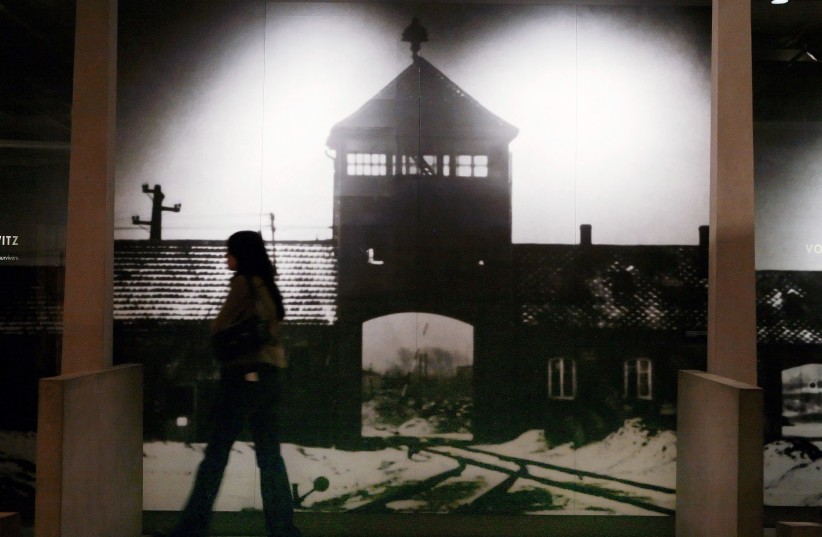(JTA) — In 1986, eight years after Jimmy Carter established the President’s Commission on the Holocaust with Elie Weisel as its chairman, little progress had been made on the Washington, DC memorial it was tasked to create.
The Holocaust survivor, memoirist and newly crowned Nobel Peace Prize laureate recognized he lacked the management and fundraising experience to build the museum and submitted his resignation.
His successor, Harvey “Bud” Meyerhoff, knew about buildings and philanthropy. Prominent in the Baltimore real estate business and philanthropies started by his father Joseph, Meyerhoff went on to raise the $150 million in private funds that built the US Holocaust Memorial Museum on federal land on the southwest edge of the Mall in Washington.
“By its very existence at the heart of our great democracy, this museum will teach generations to come not only about the awful events of the past, but about the awful consequences of bigotry, oppression, hatred and intolerance,” Meyerhoff said at the dedication ceremonies on April 22, 1993, in the presence of Wiesel and President Bill Clinton. “And about the responsibilities that each of us has as citizens of a democratic society.”
Meyerhoff, a home builder and prominent supporter of the arts, culture and education in Baltimore and Israel, died Sunday at his Baltimore County home. He was 96.

“As chair for over 6 years — he succeeded Elie Wiesel — Bud guided the design, and oversaw the construction and fundraising that allowed the museum to open on time and on budget in 1993 — a task many considered impossible until he assumed the chair role,” his daughter, Lee Hendler, told the Baltimore Sun.
Although he may have achieved the impossible, Meyerhoff couldn’t withstand the internal political winds that swirled around the Holocaust museum and its fractious commission. Even as finishing touches were being put on the museum, its stakeholders debated its mission, with some charging that Meyerhoff’s vision was too universal for a memorial they felt should focus squarely on the genocide of the Jews. Just weeks before the museum’s dedication, and before Meyerhoff could lead the search for the open executive director position, the Clinton administration announced its decision to replace him.
Meyerhoff’s allies decried the abrupt timing of the decision, but Meyerhoff, who himself donated $6 million to the museum, sought to remain above the fray. “We will continue to work with the White House and the new leadership to ensure a smooth transition and successful start-up of museum operations,” he said in a statement.
Meyerhoff's early life
Harvey Meyerhoff was born in Baltimore on April 6, 1927. His father immigrated to Baltimore from Russia in 1906 as a young boy. The elder Meyerhoff built a successful real estate business that he would later run with Harvey and Joseph’s son-in-law Jack Pearlstone. Joseph Meyerhoff was also a prominent philanthropist; the Baltimore Symphony Orchestra’s concert hall bears his name.
Harvey earned a degree at the University of Wisconsin and served in the Navy near the end of World War II, returning home to join the family business, eventually becoming CEO of Monumental Properties, Inc. and president of Magna Properties, Inc.
In 1948, Harvey married Lyn Pancoe, and together they helped found the National Aquarium in Baltimore and the Harvey M. and Lyn P. Meyerhoff Inflammatory Bowel Disease Center at Johns Hopkins Hospital. They were also supporters of the Baltimore Symphony Orchestra, the National Aquarium, the National Zoo, Baltimore Museum of Art, the Walters Art Museum and the Maryland Institute College of Art. Meyerhoff also had a minority stake in the Baltimore Orioles.
Prior to her death in 1988, Lyn, a prominent Republican donor, lobbied President Ronald Reagan to obtain the land for what would become the US Holocaust Memorial Museum.
Harvey directed the Joseph and Harvey Meyerhoff Family Charitable Funds’ grantmaking until early 2000. Its giving in Israel focuses on civil and shared society, developing communities in the geographic periphery and capital projects that include daycare centers, playgrounds, sports facilities and libraries.
The Meyerhoff New Jewish Family Innovation Fund, run through Baltimore’s Jewish federation, promotes programs that engage people of color, adoptees, single parents and LGBTQ parents and children.
Although detractors asked why the federal government would support the creation of and give pride of place to a privately funded museum dedicated to a historical tragedy perpetrated an ocean away, the US Holocaust Memorial Museum has since become a fixture in Washington and an important institution for remembering the Holocaust and its lessons.
Meyerhoff laid out that vision in his dedication speech. “This building tells the story of events that human eyes should never have seen even once; but having been seen, must never be forgotten,” he said. “Through this museum, our eyes will always see; our hearts will always feel.”
Meyerhoff is survived by his second wife, Phyllis Cahn Meyerhoff; daughters Terry Rubenstein, Lee Hendler and Zoh Hieronimus; a son, Joe Meyerhoff II; 10 grandchildren, and 14 great-grandchildren.
